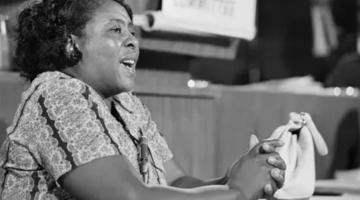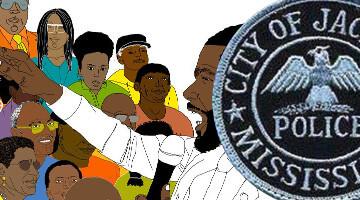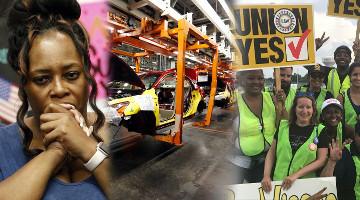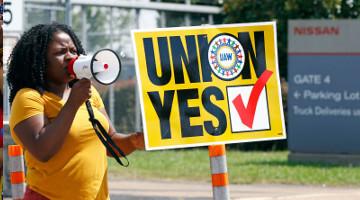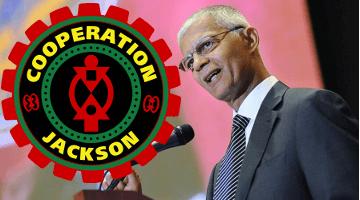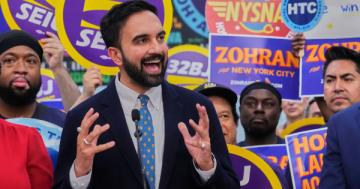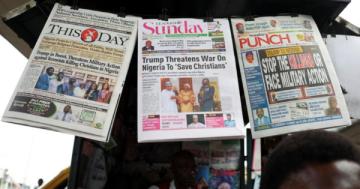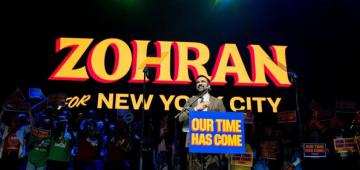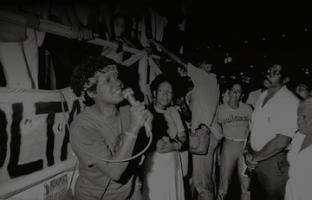A 1965 Freedomways interview with Mrs. Fannie Lou Hamer provides an unvarnished and unsentimental portrait of Mississippi – and of the tasks of the Freedom Movement.
In the spring of 1965, Freedomways: The Quarterly Journal of the Negro Movement published a special issue with the title “Mississippi: Opening up the Closed Society.” Guest edited by activist and organizer Hunter Pitts “Jack” O’Dell, the issue was a response to a cluster of incidents that had “imprinted Mississippi on the national conscience” – including “the murder of Emmett Till, the lynching of Charles Mack Parker in the ‘moderate’ Gulf section of Mississippi, the ‘freedom rides’ to Jackson, the events at Oxford, Mississippi, and the triple lynching of the martyred Civil Rights workers, Chaney, Schwerner, and Goodman.” The opening editorial of the issue noted that much of the writing on Mississippi was based on “emotional appeal and shock-value” and had avoided serious and sober analysis of the political, economic, and cultural factors that had institutionalized racism in the state. Yet the editorial also argued that Mississippi should not be seen as an exotic or exceptional part of the Union. Not only was the violence in Mississippi the continuation of a long, historical legacy of violence against Indigenous and African peoples in the United States, but that violence was enabled and abetted by the political and economic connections Mississippi had to the rest of the country. While Mississippi may have been unknown (hence, the title “Opening up the Closed Society”), it was very much a part of the US. The special issue of Freedomways, with its dossier of editorials, essays, photographs, and documents, was meant to serve as a corrective to Mississippi’s misrepresentations.
Among the contributions to the issue was a remarkable interview with the legendary Mississippi-born activist Mrs. Fannie Lou Hamer conducted by O’Dell. Mrs. Hamer was one of the most important figures of the civil rights movement whose activism - organizing for the Student Non-Violent Coordinating Committee, organizing the 1964 Freedom Summer, co-founding the Mississippi Freedom Democratic Party, co-founding the National Women’s Political Caucus, launching the Freedom Farm Cooperative (which bought up land for Black people to own and farm collectively), among other things - earned her a soaring national reputation.
At the time of the interview, Mrs. Hamer was Vice-Chairman of the Mississippi Freedom Democratic Party (MFDP), and its candidate for Congress from Mississippi’s Second Congressional District. In the interview, Mrs. Hamer recounts the brutal experiences of race, class, and gender that shaped her childhood, the impact of the Freedom Movement on her political consciousness, and the effects a recent trip to Africa had on her thinking. While the interview provides us with a stark vision of Mississippi in 1965, it can also be read as a somber assessment of how much work the Freedom Movement still has ahead of it today. We reproduce the interview below.
Life in Mississippi: An Interview with Mrs. Fannie Lou Hamer
Jack O’Dell
O'Dell: Mrs. Hamer, it’s good to see you again. I understand you have been to Africa since we last talked? I would like for you to talk about your African trip today.
Hamer: It was one of the proudest moments in my life.
O'Dell: That is a marvelous experience for any black American particularly for anyone who has lived here all of his life. Then, too, we want to talk about some of your early childhood experiences which helped to make you the kind of person you are and provided the basis for your becoming so active in the Freedom Movement.
Hamer: I would like to talk about some of the things that happened that made me know that there was something wrong in the south from a child. My parents moved to Sunflower County when I was two years old. I remember, and I will never forget, one day—I was six years old and I was playing beside the road and this plantation owner drove up to me and stopped and asked me “could I pick cotton.” I told him I didn’t know and he said, “Yes, you can. I will give you things that you want from the commissary store,” and he named things like crackerjacks and sardines—and it was a huge list that he called off.
So I picked the 30 pounds of cotton that week, but I found out what actually happened was he was trapping me into beginning the work I was to keep doing and I never did get out of his debt again. My parents tried so hard to do what they could to keep us in school, but school didn’t last but four months out of the year and most of the time we didn’t have clothes to wear. My parents would make huge crops of sometimes 55 to 60 bales of cotton. Being from a big family where there were 20 children, it wasn’t too hard to pick that much cotton. But my father, year after year, didn’t get too much money and I remember he just kept going. Later on he did get enough money to buy mules. We didn’t have tractors, but he bought mules, wagons, cultivators and some farming equipment. As soon as he bought that and decided to rent some land, because it was always better if you rent the land, but as soon as he got the mules and wagons and everything, somebody went to our trough—a white man who didn’t live very far from us—and he fed the mules Paris Green, put it in their food and it killed the mules and our cows. That knocked us right back down. And things got so tough then I began to wish I was white. We worked all the time, just worked and then we would be hungry and my mother was clearing up a new ground trying to help to feed us for $1.25 a day. She was using an axe, just like a man, and something flew up and hit her in her eye. It eventually caused her to lose both her eyes and I began to get sicker and sicker of the system there. I used to see my mother wear clothes that would have so many patches on them, they had been done over and over and over again. She would do that but she would try to keep us decent. She still would be ragged and I always said if I lived to get grown and had a chance, I was going to try to get something for my mother and I was going to do something for the black man of the south if it would cost my life; I was determined to see that things were changed.
My mother got down sick in 53 and she lived with me, an invalid, until she passed away in 1961. And during the time she was staying with me sometime I would be worked so hard I couldn't sleep at night. ...
O’Dell: What kind of work were you doing?
Hamer: I was a timekeeper and sharecropper on the same plantation I was fired from. During the time she was with me, if there was something I had to do without, I was determined to see that she did have something in her last few years. I went almost naked to see that my mother was kept decent and treated as a human being for the first time in all of her life. My mother was a great woman. To look at her from the suffering she had gone through to bring us up—20 children: 6 girls and 14 boys, but still she taught us to be decent and to respect ourselves, and that is one of the things that has kept me going, even after she passed. She tried so hard to make life easy for us. Those are the things that forced me to try to do something different and when this Movement came to Mississippi I still feel it is one of the greatest things that ever happened because only a person living in the State of Mississippi knows what it is like to suffer; knows what it is like to be hungry; knows what it is like to have no clothing to wear. And these people in Mississippi State, they are not “down”; all they need is a chance. And I am determined to give my part not for what the Movement can do for me, but what I can do for the Movement to bring about a change in the State of Mississippi. Actually, some of the things I experienced as a child still linger on; what the white man has done to the black people in the south!
One of the things I remember as a child: There was a man named Joe Pulliam. He was a great Christian man; but one time, he was living with a white family and this white family robbed him of what he earned. They didn’t pay him anything. This white man gave him $150 to go to the hill, (you see, I lived in the Black Belt of Mississippi) ...to get another Negro family. Joe Pulliam knew what this white man had been doing to him so he kept the $150 and didn’t go. This white man talked with him then shot him in the shoulder and Joe Pulliam went back into the house and got a Winchester and killed this white man. The other white fellow that was with him he “outrun the word of God” back to town. That gave this Negro a chance to go down on the bayou that was called Powers Bayou and he got in a hollowed-out stump where there was enough room for a person. He got in there and he stayed and was tracked there, but they couldn’t see him and every time a white man would peep out, he busted him. He killed 13 white men and wounded 26 and Mississippi was a quiet place for a long time. I remember that until this day and I won’t forget it. After they couldn’t get him, they took gas—one man from Clarksdale used a machine gun— (Bud Doggins) —they used a machine gun and they tried to get him like that and then they took gas and poured it on Powers Bayou. Thousands of gallons of gas and they lit it and when it burned up to the hollowed-out stump, he crawled out. When they found him, he was unconscious and he was lying with his head on his gun but the last bullet in the gun had been snapped twice. They dragged him by his heels on the back of a car and they paraded about with that man and they cut his ears off and put them in a showcase and it stayed there a long, long time—in Drew, Mississippi. All of those things, when they would happen, would make me sick in the pit of my stomach and year after year, every time something would happen it would make me more and more aware of what would have to be done in the State of Mississippi.
O'Dell: What do you think will have to be done?
Hamer: The only thing I really feel is necessary is that the black people, not only in Mississippi, will have to actually upset this apple-cart. What I mean by that is, so many things are under the cover that will have to be swept out and shown to this whole world, not just to America. There is so much hypocrisy in America. This thing they say of “the land of the free and the home of the brave” is all on paper. It doesn’t mean anything to us. The only way we can make this thing a reality in America is to do all we can to destroy this system and bring this thing out to the light that has been under the cover all these years. That’s why I believe in Christianity because the Scriptures said: “The things that have been done in the dark will be known on the house tops.” Now many things are beginning to come out and it was truly a reality to me when I went to Africa, to Guinea. The little things that had been taught to me about the African people, that they were “heathens,” “savages,” and they were just downright stupid people. But when I got to Guinea, we were greeted by the Government of Guinea, which is Black People—and we stayed at a place that was the government building, because we were the guests of the Government. You don’t know what that meant to me when I got to Guinea on the 12th of September. The President of Guinea, Sekou Touré, came to see us on the 13th. Now you know, I don’t know how you can compare this by me being able to see a President of a country, when I have just been there two days; and here I have been in America, born in America, and I am 46 years pleading with the President for the last two to three years to just give us a chance—and this President in Guinea recognized us enough to talk to us.
O’Dell: How many were in your delegation?
Hamer: It was eleven of us during that time, and I could get a clear picture of actually what had happened to the black people of America. Our foreparents were mostly brought from West Africa, the same place that we visited in Africa. We were brought to America and our foreparents were sold; white people bought them; white people changed their names … and actually ... here, my maiden name is supposed to be Townsend; but really, what is my maiden name...? … What is my name? This white man who is saying “it takes time.” For three hundred and more years they have had “time,” and now it is time for them to listen. We have been listening year after year to them and what have we got? We are not even allowed to think for ourselves. “I know what is best for you,” but they don’t know what is best for us! It is time now to let them know what they owe us, and they owe us a great deal. Not only have we paid the price with our names in ink, but we have also paid in blood. And they can’t say that black people can’t be intelligent, because going back to Africa, in Guinea, there are almost 4 million people there and what he, President Touré, is doing to educate the people: as long as the French people had it they weren’t doing a thing that is being done now. I met one child there eleven years old, speaking three languages. He could speak English, French and Malinke. Speaking my language actually better than I could. And this hypocrisy—they tell us here in America.
People should go there and see. It would bring tears in your eyes to make you think of all those years, the type of brain-washing that this man will use in America to keep us separated from our own people. When I got on that plane, it was loaded with white people going to Africa for the Peace Corps. I got there and met a lot of them, and actually they had more peace there in Guinea than I have here. I talked to some of them. I told them before they would be able to clean up somebody else’s house you would have to clean up yours; before they can tell somebody else how to run their country, why don’t they do something here. This problem is not only in Mississippi. During the time I was in the Convention in Atlantic City, I didn’t get any threats from Mississippi. The threatening letters were from Philadelphia, Chicago and other big cities.
O'Dell: You received threatening letters while you were at the Convention?
Hamer: Yes. I got pictures of us and they would draw big red rings around us and tell what they thought of us. I got a letter said, “I have been shot three times through the heart. I hope I see your second act.” But this white man who wants to stay white, and to think for the Negro, he is not only destroying the Negro, he is destroying himself, because a house divided against itself cannot stand and that same thing applies to America. America that is divided against itself cannot stand, and we cannot say we have all of this unity they say we have when black people are being discriminated against in every city in America I have visited.
I was in jail when Medgar Evers was murdered and nothing, I mean nothing has been done about that. You know what really made me sick? I was in Washington, D. C. at another time reading in a paper where the U.S. gives Byron de la Beckwith—the man who is charged with murdering Medgar Evers—they were giving him so much money for some land and I ask “Is this America?” We can no longer ignore the fact that America is NOT the “land of the free and the home of the brave.” I used to question this for years—what did our kids actually fight for? They would go in the service and go through all of that and come right out to be drowned in a river in Mississippi. I found this hypocrisy is all over America.
The 20th of March in 1964, I went before the Secretary of State to qualify to run as an official candidate for Congress from the 2nd Congressional District, and it was easier for me to qualify to run than it was for me to pass the literacy test to be a registered voter. And we had four people to qualify and run in the June primary election but we didn’t have enough Negroes registered in Mississippi. The 2nd Congressional District where I ran, against Jamie Whitten, is made up of 24 counties. Sixty-eight per cent of the people are Negroes, only 6-8 per cent are registered. And it is not because Negroes don’t want to register. They try and they try and they try. That’s why it was important for us to set up the “Freedom Registration” to help us in the Freedom Democratic Party.
O’Dell: This was a registration drive organized by the Movement?
Hamer: Yes. The only thing we took out was the Constitution of the State of Mississippi and the interpretation of the Constitution. We had 63,000 people registered on the Freedom Registration form. And we tried from every level to go into the regular Democratic Party medium. We tried from the precinct level. The 16th of June when they were holding precinct meetings all across the state, I was there and there was eight of us there to attend the meeting, and they had the door locked at 10 o'clock in the morning. So we had our own meeting and elected our permanent chairman and secretary and regulars and alternates and we passed a resolution as the law requires and then mailed it to Oscar Townsend, our permanent chairman. This is what’s happening in the State of Mississippi. We had hoped for a change, but these people (Congressmen) go to Washington and stay there 25 and 30 years and more without representing the people of Mississippi. We have never been represented in Washington.
You can tell this by the program the federal government had to train 2,400 tractor drivers. They would have trained Negro and white together, but this man, Congressman Jamie Whitten, voted against it and everything that was decent. So, we've got to have somebody in Washington who is concerned about the people of Mississippi. After we testified before the Credentials Committee in Atlantic City, their Mississippi representative testified also. He said I got 600 votes but when they made the count in Mississippi, I was told I had 388 votes. So actually it is no telling how many votes I actually got.
O'Dell: In other words, a Mr. Collins came before the Credentials Committee of the Democratic National Convention and actually gave away the secret in a sense, because the figure he gave was not the same figure he gave to you as an official candidate?
Hamer: That’s right. He also said I had been allowed to attend the precinct meeting which was true. But he didn’t say we were locked out of the polling place there and had to hold our meeting on the lawn.
O'Dell: So now you have a situation where you had the basis for a Freedom Democratic Party. You have had four candidates to run for Congress. You had a community election where 63,000 of our folk showed their interest in the election. How do you size up the situation coming out of Atlantic City? What impressions did you get from your effort in Atlantic City to be seated, and how do you feel the people back home are going to react to this next period you are going into?
Hamer: The people at home will work hard and actually all of them think it was important that we made the decision that we did make not to compromise; because we didn’t have anything to compromise for. Some things I found out in the National Convention I wasn’t too glad I did find out. But we will work hard, and it was important to actually really bring this out to the open, the things I will say some people knew about and some people didn’t; this stuff that has been kept under the cover for so many years. Actually, the world and America is upset and the only way to bring about a change is to upset it more.
O'Dell: What was done about the beating you and Miss Annelle Ponder, your colleague in the citizenship school program, experienced while in jail? Was any action taken at all?
Hamer: The Justice Department filed a suit against the brutality of the five law officials and they had this trial. The trial began the 2nd of December 1963 and they had white jurors from the State of Mississippi, and the Federal Judge Clayton made it plain to the jurors that they were dealing with “nigras” and that “who would actually accuse such upstanding people like those law officials”—be careful what they was doing because they are law-abiding citizens and were dealing with agitators and niggers. It was as simple as that? And those police were cleared. They were on the loose for about a week before I left for Atlantic City. One of those men was driving a truck from the State Penitentiary. One night he passed my house and pointed me out to one of the other men in the State Penitentiary truck and that same night I got a threat: “We got you located Fannie Lou and we going to put you in the Mississippi River.” A lot of people say why do they let the hoodlums do that? But it is those people supposed to have class that are doing the damage in Mississippi. You know there was a time, in different places, when people felt safe going to a law official. But I called them that day and got the answer back, “You know you don’t look to us for help.”
O'Dell: This threat: the man called you up and said “we've got you spotted”; I gather from that that the river has some special meaning to us living there in Mississippi.
Hamer: Yes. So many people have been killed and put in the Mississippi River. Like when they began to drag the river for Mickey [Michael Schwerner] and [James] Chaney and Andy [Andrew Goodman]. Before he was to go to Oxford, Ohio, Mickey was telling me his life had been threatened and a taxi driver had told him to be careful because they was out to get him. When they (the sailors) began to drag the river they found other people and I actually feel like they stopped because they would have been shook up to find so many if they had just been fishing for bodies. The Mississippi is not the only river. There’s the Tallahatchie and the Big Black. People have been put in the river year after year, these things been happening.
O'Dell: The general policy of striking fear in people’s hearts. In other words, it is like lynching used to be. They used to night ride...
Hamer: They still night ride. The exact count was 32 churches they had burned in the State of Mississippi and they still ride at night and throw bombs at night. You would think they would cut down with Mrs. Chaney. But since they murdered James Chaney, they have shot buckshot at his mother’s house. And hate won't only destroy us. It will destroy these people that’s hating as well. And one of the things is, they are afraid of getting back what they have been putting out all of these years. You know the Scripture says “be not deceived for God is not mocked; whatsoever a man sow that shall he also reap.” And one day, I don’t know how they're going to get it, but they're going to get some of it back. They are scared to death and are more afraid now than we are.
O'Dell: How active is the White Citizen’s Council? Has it the kind of outlet through TV and radio and so forth that Negroes are aware of its presence?
Hamer: They announce their programs. In fact, one day I was going to Jackson and I saw a huge sign that U.S. Senator John Stennis was speaking that night for the White Citizens Council in Yazoo City and they also have a State Charter that they may set up for “private schools.” It is no secret.
O'Dell: Does it seem to be growing? Is the white community undergoing any change as a result of all the pressure that has been put now with the Mississippi Summer Project and the killing of the three civil rights workers. What effect is it having on the white community?
Hamer: You can’t ever tell. I have talked to two or three whites that’s decent in the State of Mississippi, but you know, just two or three speaking out. I do remember, one time, a man came to me after the students began to work in Mississippi and he said the white people were getting tired and they were getting tense and anything might happen. Well, I asked him “how long he thinks we had been getting tired”? I have been tired for 46 years and my parents was tired before me and their parents were tired; and I have always wanted to do something that would help some of the things I would see going on among Negroes that I didn’t like and I don’t like now.
O'Dell: Getting back just for a minute to Atlantic City. You all were in the national spotlight because there was nothing else happening in the Democratic National Convention other than your challenge to the Mississippi delegation and I would like to go back to that and pull together some of the conclusions you might have drawn from that experience.
Hamer: In coming to Atlantic City, we believed strongly that we were right. In fact, it was just right for us to come to challenge the seating of the regular Democratic Party from Mississippi. But we didn’t think when we got there that we would meet people, that actually the other leaders of the Movement would differ with what we felt was right. We would have accepted the Green proposal. But, when we couldn’t get that, it didn’t make any sense for us to take “two votes at large.” What would that mean to Mississippi? What would it have meant to us to go back and tell the Mississippi people? And actually, I think there will be great leaders emerging from the State of Mississippi. The people that have the experience to know and the people not interested in letting somebody pat you on the back and tell us “I think it is right.” And it was very important for us not to accept a compromise and after I got back to Mississippi, people there said it was the most important step that had been taken. We figured it was right and it was right, and if we had accepted that compromise, then we would have been letting the people down in Mississippi. Regardless of leadership, we have to think for ourselves!
O'Dell: In other words, you had two battles on your hands when you went to Atlantic City?
Hamer: Yes. I was in one of the meetings when they spoke about accepting two votes and I said I wouldn't. dare think about anything like this. So, I wasn’t allowed to attend the other meetings. It was quite an experience.
O'Dell: There will be other elections and other conventions and the people in Mississippi should be a little stronger.
Hamer: I think so.
O'Dell: Well, it’s good to know that the people you have to work with every day are with you.
Hamer: Yes, they are with us one hundred per cent.
O’Dell: That’s encouraging because it makes the work that much easier. Is there any final thing you want to say that is part of this historic statement of life in Mississippi for yourself as a person who lives there?
Hamer: Nothing other than we will be working. When I go back to Mississippi we will be working as hard or harder to bring about a change, but things arẹ not always pleasant there.
O'Dell: You will probably have the support of more people than you have ever had, all around the country.
Hamer: Yes, actually since the Convention I have gotten so many letters that I have tried to answer but every letter said they thought this decision, not to accept the compromise, was so important. There wasn't one letter I have gotten so far that said we should have accepted the compromise—not one.
O'Dell: So, those are the people who are interested in your work, and as you get back into the main swing of things you will be keeping in touch with those people so that they should be asked to help in any way they can regardless of where they live. It is national and international public pressure that is needed.
Are you aware that there has been any coverage of the African trip by the Mississippi press? Have they made any comments on it?
Hamer: I don’t know about the press, but I know in the town where I live everybody was aware that I was in Africa, because I remember after I got back some of the people told me that Mayor Durr of our town said he just wished they would boil me in tar. But, that just shows how ignorant he is, I didn’t see any tar over there. But I was treated much better in Africa than I was treated in America. And you see, often I get letters like this: “Go back to Africa.” Now I have just as much right to stay in America—in fact, the black people have contributed more to America than any other race, because our kids have fought here for what was called “democracy”; our mothers and fathers were sold and bought here for a price. So all I can say when they say “go back to Africa,” I say “when you send the Chinese back to China, the Italians back to Italy, etc., and you get on that Mayflower from whence you came, and give the Indians their land back, who really would be here at home?” It is our right to stay here and we will stay and stand up for what belongs to us as American citizens, because they can’t say that we haven't had patience.
O'Dell: Was there a lot of interest in your trip among the African people that you met?
Hamer: Yes. I saw how the Government was run there and I saw where black people were running the banks. I saw, for the first time in my life, a black stewardess walking through a plane and that was quite an inspiration for me. It shows what black people can do if we only get the chance in America. It is there within us. We can do things if we only get the chance. I see so many ways America uses to rob Negroes and it is sinful and America can’t keep holding on, and doing these things. I saw in Chicago, on the street where I was visiting my sister-in-law, this “Urban Renewal” and it means one thing: “Negro removal.” But they want to tear the homes down and put a parking lot there. Where are those people going? Where will they go? And as soon as Negroes take to the street demonstrating, one hears people say, “they shouldn’t have done it.” The world is looking at America and it is really beginning to show up for what it is really like. “Go Tell It on the Mountain.” We can no longer ignore this, that America is not “the land of the free and the home of the brave.”
O'Dell: Thank you, Mrs. Fannie Lou Hamer, Vice-Chairman of the Freedom Democratic Party of Mississippi; courageous fighter for human rights.
Life in Mississippi: An Interview with Mrs. Fanie Lou Hamer, Freedomways: The Quarterly Journal of the Negro Movement 5 no. 2 (Spring 1965).

